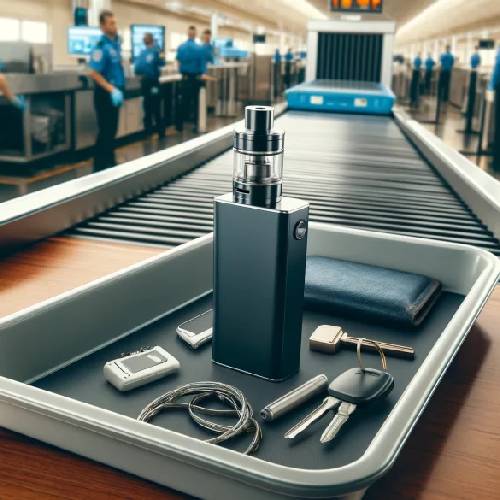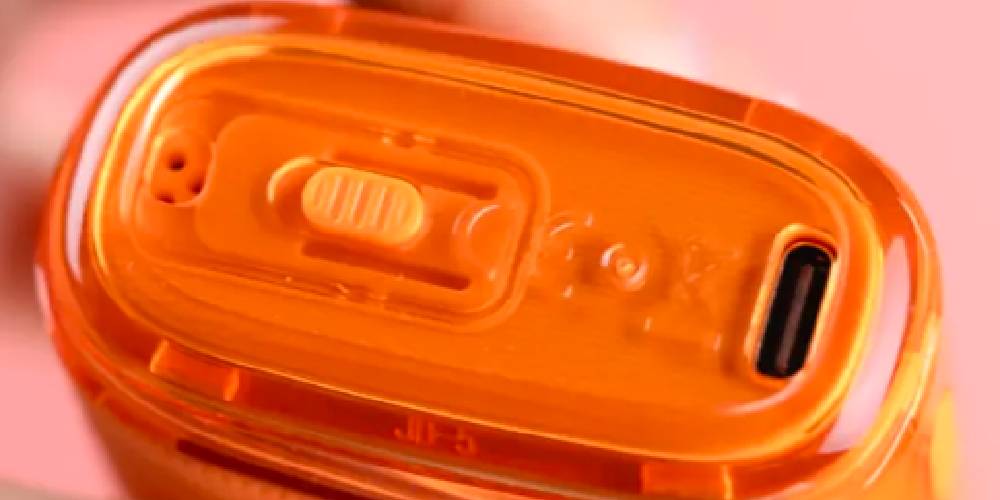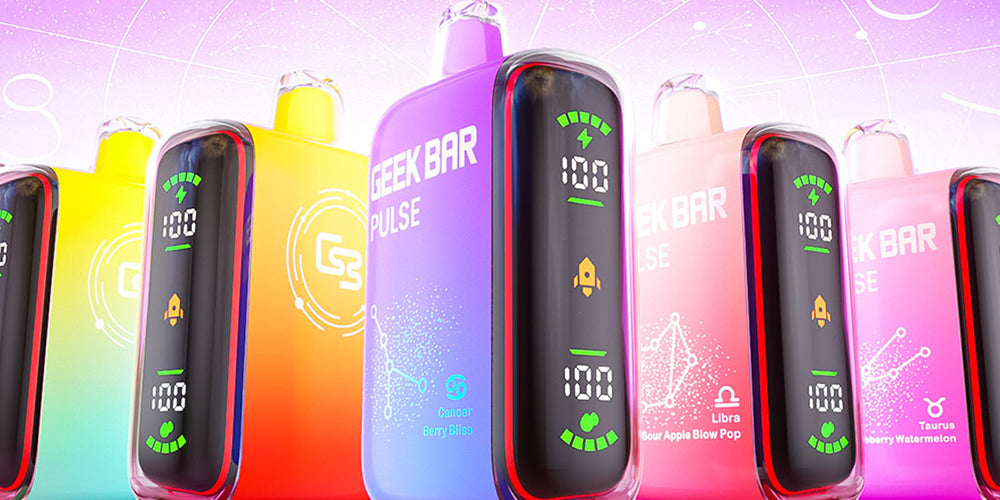Key Takeaways
- Geek Bars Likely Won't Set Off Metal Detectors: Their small metal components are usually not enough to trigger alarms in most security systems.
- Minimal Metal Content: The battery, coil, and other parts contain only small amounts of metal, unlikely to cause issues unless detectors are highly sensitive.
- Expect a Secondary Inspection: If your Geek Bar does trigger an alarm, be prepared for a quick manual check or X-ray screening.
- Keep Geek Bars in Carry-On Luggage: Due to lithium-ion batteries, Geek Bars should be packed in carry-on bags, not checked luggage.
- Know Local Vaping Laws: Always check the vaping regulations of your destination to ensure compliance when traveling with a Geek Bar.
What is a Geek Bar?
A Geek Bar is a disposable vape device designed to provide a hassle-free vaping experience. Unlike traditional vaping devices that require refills, maintenance, or charging, Geek Bars are pre-filled with e-liquid and come with a built-in battery, ready to use straight out of the box. Once the e-liquid runs out, the device is simply disposed of. This makes it an appealing option for those who prefer convenience without the added effort of managing multiple components.
The Geek Bar’s design is sleek, compact, and lightweight, making it easy to carry around and use. Its user-friendly nature has made it a popular choice for both beginners and experienced vapers. The device eliminates the need for complicated setups or adjustments, making it perfect for those who want a straightforward, satisfying vape experience. It is also discreet, which adds to its appeal, as it doesn’t take up much space or attract too much attention.
Additionally, Geek Bars come in a wide variety of flavors, ranging from fruity to menthol, catering to a broad range of tastes. This versatility is one of the key factors behind its growing popularity in the vaping community. Whether you are new to vaping or a seasoned enthusiast, the Geek Bar offers a simple, reliable, and enjoyable option. As a disposable device, it provides ease of use and portability, making it a go-to choice for those looking for a no-fuss vaping experience. With these qualities, it’s no surprise that Geek Bars have quickly become a favorite among vapers worldwide.
What Triggers a Metal Detector?
To understand whether a Geek Bar can trigger a metal detector, it’s important to know how these devices operate. Metal detectors are primarily used in high-security areas, such as airports, concerts, and sporting events, to detect hidden metallic objects that could pose a threat. These detectors work by emitting electromagnetic fields that pass through objects and materials. When an object containing metal enters the electromagnetic field, it disrupts the flow of energy, and this disruption is detected by the sensor. The detector then alerts security personnel to the presence of metal.
Metal detectors are designed to detect a variety of metallic objects, such as weapons, knives, and tools, which can pose a safety risk. However, smaller items, like coins, belt buckles, and even electronic devices, can also trigger the detector, depending on the sensitivity settings. The sensitivity can vary, with some detectors set to high levels to pick up small metallic objects, while others are calibrated for larger items. This is why the amount and type of metal in an object play a key role in whether it will set off the alarm. For most security environments, detectors are primarily tuned to pick up on larger threats, meaning smaller devices like a Geek Bar might not trigger an alarm unless the detector is particularly sensitive.
Types of Metal Detectors
There are several types of metal detectors used in security settings. The most common ones you’ll encounter at airports or security checkpoints are:
- Walk-Through Detectors: These are large detectors you walk through, often used in airports or at large events. They create a magnetic field around your body as you walk through, and if any metal objects are present on or near your body, they disrupt the field and trigger an alarm.
- Handheld Detectors: These are smaller, portable devices that security personnel use for a more focused scan. If a metal object is suspected, security staff will use these detectors to pinpoint the location of the item on your body or within your bag.
The goal of these detectors is to identify metallic objects that could pose a security threat, such as firearms, knives, or other dangerous items. For most standard detectors, the presence of metal objects such as coins, belt buckles, or jewelry can also trigger a response, though the alarms are usually set at a lower sensitivity to reduce false positives.
What Metal Components Are in a Geek Bar?
Geek Bar vapes are constructed with several components, some of which include metal parts. These metal components are necessary for the functionality of the device, but they also raise the question of whether they could set off a metal detector.
- The Battery: Geek Bars uses lithium-ion batteries, which contain various metals like copper, aluminum, and lithium. While these batteries are relatively small and lightweight, they do contribute a significant portion of the overall weight and structure of the device. Depending on the sensitivity of the metal detector, the battery might be enough to trigger an alarm, especially if the detector is set to a high sensitivity.
- The Coil: Inside the vape, there is a coil that heats the e-liquid to create vapor. These coils are made from metal (usually wire made from materials like kanthal, nichrome, or stainless steel). Although these coils are tiny, they are still composed of metal and could potentially trigger a metal detector, especially if the detector is designed to pick up on small metal objects.
- Mouthpiece and Cartridge: The mouthpiece of the Geek Bar is typically made of plastic or resin, but some designs might include a small metal component, particularly around the threading area where the mouthpiece attaches to the body. Additionally, the cartridge that holds the e-liquid might have metal components for durability and ease of use.
- Other Metal Parts: Depending on the design of the specific Geek Bar model, other small metal parts may be present, including springs, screws, or connectors. While these parts are usually quite small, they still contain metal and could, in theory, be detected by a sensitive enough metal detector.
Do Geek Bars Set Off Metal Detectors?
The big question on everyone’s mind is whether these metal components in a Geek Bar are likely to set off a metal detector. The answer is: it depends. There are several factors that come into play when determining whether a Geek Bar will trigger a metal detector alarm.
- Size of the Metal Components: The metal components in a Geek Bar are relatively small, especially when compared to other items that are more likely to trigger an alarm, such as firearms or large knives. The amount of metal in a Geek Bar is minimal, so it is unlikely to set off a metal detector under normal circumstances.
- Sensitivity of the Metal Detector: Metal detectors vary in terms of sensitivity. Some detectors are calibrated to pick up only large metallic objects, while others are designed to detect even small amounts of metal. In high-security environments, where the detectors are finely tuned to detect small pieces of metal, it is possible that the Geek Bar could set off the alarm. However, in most cases, the sensitivity of the detectors used in airports and general security settings is not high enough for a Geek Bar to be flagged.
- Type of Metal in the Device: The metals used in Geek Bars are generally non-ferrous or low-magnetic metals (such as aluminum or copper). These metals are less likely to trigger an alarm compared to ferrous metals (like iron or steel) because they don't have the same magnetic properties that metal detectors are tuned to detect. However, it is still possible for the combination of these metals to disrupt the detector's electromagnetic field.
- The Design of the Geek Bar: Some disposable vapes are designed with very little metal, relying mostly on plastic components. These devices are much less likely to set off a metal detector. However, the more robust designs, particularly those with larger batteries and metal coil systems, are more likely to trigger an alarm.
What Happens If a Geek Bar Does Set Off a Metal Detector?
In the event that your Geek Bar sets off a metal detector, don’t panic. Most of the time, this doesn’t mean you’re in any kind of trouble. It simply means that the security personnel will need to take a closer look at your device. Here’s what you can expect if your Geek Bar triggers a metal detector:
- Secondary Inspection: If the alarm goes off, security personnel may ask you to step aside for further inspection. This could involve a pat-down, a manual inspection of your bag, or a secondary scan using a handheld metal detector.
- X-Ray Screening: In some cases, if security is unsure of what the device is, they may send your Geek Bar through an X-ray scanner to get a better look at the internal components. This is a standard procedure and doesn’t mean that your device will be confiscated.
- Explanation: If you’re carrying a Geek Bar, it’s always a good idea to be honest and upfront with security. Vaping devices, including Geek Bars, are legal in most countries, and security personnel are typically familiar with these types of devices. Simply explain what it is, and you should be cleared quickly.
- No Confiscation (Usually): In most cases, Geek Bars will not be confiscated unless they violate specific local regulations regarding vaping devices. As long as you’re following the rules for traveling with vaping products (e.g., ensuring the device is not in your checked luggage, not exceeding e-liquid quantity limits, etc.), your Geek Bar should not be taken away.

Tips for Traveling with Geek Bars
If you’re traveling with a Geek Bar and want to avoid any potential issues at security checkpoints, here are a few tips to help ensure a smooth process:
- Keep Your Geek Bar in Your Carry-On Bag: In most cases, disposable vapes like the Geek Bar should be kept in your carry-on luggage, as they typically contain lithium-ion batteries, which are not allowed in checked luggage. This also makes it easier for you to quickly pull it out for inspection if needed.
- Be Aware of Local Regulations: Different countries and airports have different regulations regarding vaping products. Some places may restrict or ban the use of e-cigarettes, while others may have strict rules on how much e-liquid you can carry. It’s always a good idea to check the rules for your destination before you travel.
- Ensure Your Geek Bar is Fully Charged: A fully charged Geek Bar is less likely to raise suspicion, as a dead or malfunctioning vape might draw more attention from security personnel.
- Prepare for a Secondary Screening: If your Geek Bar does set off a metal detector, don’t be surprised if security asks to inspect it further. Always be polite and cooperative during this process to avoid delays.
Final Thoughts
In conclusion, while Geek Bars do contain metal components, they are generally not large enough or made of materials that are likely to set off a standard metal detector. The likelihood of your Geek Bar causing a security alarm is low, but it’s still a possibility, especially if you’re going through a high-security area with highly sensitive detectors.
To minimize any potential inconvenience, be prepared for a possible secondary inspection, keep your Geek Bar in your carry-on bag, and always be aware of local regulations. As long as you stay informed and follow the rules, you should be able to travel with your Geek Bar without much hassle.
FAQs About Geek Bars and Metal Detectors
Do Geek Bars set off metal detectors?
While it is unlikely, Geek Bars may set off metal detectors due to the small metal components inside, such as the lithium-ion battery and the metal coil. The sensitivity of the metal detector and the design of the device will determine whether it triggers an alarm. However, in most cases, Geek Bars are small enough not to cause an issue.
What parts of a Geek Bar contain metal?
Geek Bars contain several metal components, including the lithium-ion battery, metal coils for heating the e-liquid, and possibly small metal parts in the cartridge and mouthpiece. These parts are typically small and lightweight but still made of metal.
What should I do if my Geek Bar sets off a metal detector?
If your Geek Bar triggers a metal detector, security personnel will likely ask for a secondary inspection. Be prepared for a brief manual check or X-ray scan. It’s a good idea to explain that it’s a vaping device to avoid confusion.
Can I bring a Geek Bar in my checked luggage?
It’s generally not recommended to pack a Geek Bar in checked luggage because it contains a lithium-ion battery, which is typically prohibited in checked bags due to fire risks. It’s best to carry your Geek Bar in your carry-on luggage.
Are there any regulations I should be aware of when traveling with a Geek Bar?
Yes, different countries and regions have varying rules for vaping products. Some places may ban or restrict e-cigarettes, while others may have limits on the amount of e-liquid you can carry. Always check the local regulations of your destination before traveling to avoid any issues with your Geek Bar.





